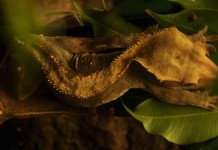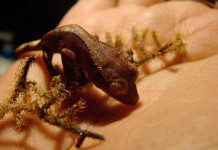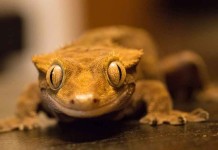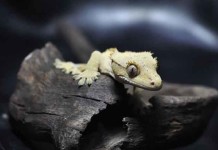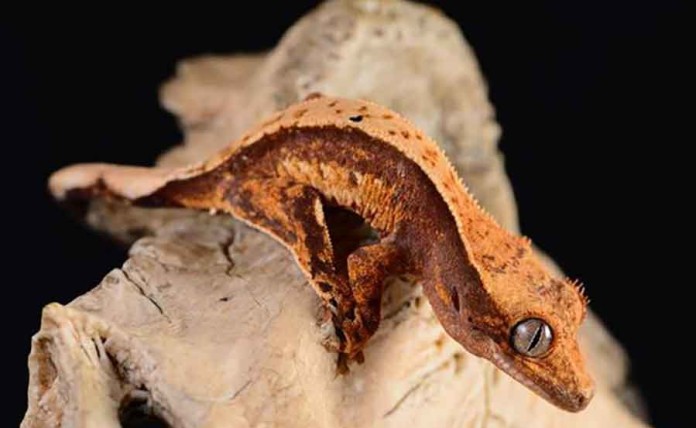Crested gecko health is generally very good, this newly discovered reptile being rather hardy and disease-free. However, there are some health issues that arise mainly due to improper care. These issues are floppy-tail syndrome, metabolic bone disease due to calcium deficiency and dysecdysis. These can all be prevented with the proper care of the crested gecko.
Floppy-tail Syndrome
Floppy-tail syndrome (FTS) is not a disease, but a condition that occurs from the crested gecko being kept in captivity. FTS is when the gecko’s tail literally flops about with no control. It is caused by the gecko resting vertically against the enclosure’s walls. The pelvis becomes unable to support the weight of the tail.
Metabolic Bone Disease (Calcium Deficiency)
Metabolic bone disease occurs when the crested gecko is not receiving enough calcium or vitamin B3, which processes the calcium. Young geckos and breeding females are more prone to this disease, since they require higher levels of calcium. The best way to prevent this disease is to make sure you feed the gecko gut loaded crickets or use a calcium/vitamin B3 supplement.
Dysecdysis (Improper Shed)
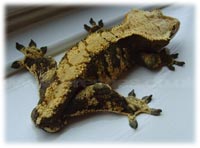 Dysecdysis is the inability to shed properly. It is generally caused by dehydration or low humidity. When the skin does not shed properly, it can dry and cause limited blood flow to the area affected. The areas that are more likely to be affected are the tail and the toes. This can cause the tail or toes to harden and fall off.
Dysecdysis is the inability to shed properly. It is generally caused by dehydration or low humidity. When the skin does not shed properly, it can dry and cause limited blood flow to the area affected. The areas that are more likely to be affected are the tail and the toes. This can cause the tail or toes to harden and fall off.
If you find stuck skin on the crested gecko, soak them in a tub of water for up to an hour. Once the skin is softened, gently remove it with tweezers. If it does not come off easily, do not force it. Let them soak for more time until you can remove the skin gently.
Other Health Issues
Other health problems may include obesity, diarrhea and pneumonia. Obesity is very common and is caused by over-feeding the gecko, especially food rich in sugars, simply because it is easier and the gecko will eat more of it.
Diarrhea is a common problem in the crested gecko, associated with a diet high in pureed foods. To prevent this, the gecko should be fed a well-balanced diet of crickets, meal replacement powder and pureed foods or fruit baby food.
Pneumonia can occur in crested geckos if their enclosure receives poor ventilation and is not kept clean. They can also contract this respiratory infection if the temperature remains too low and the enclosure is kept too wet. This problem can be exacerbated by a poor diet. This can be avoided if you provide your crested gecko with the proper habitat and nutritional balance.
Overall, crested gecko health is not an issue. They are relatively hardy reptiles that, when well taken care of, will remain healthy. Signs of a healthy crested gecko are clear eyes, highly active and alert, regular eating habits and clear nose and vent. Take good care of your crested gecko and they will be around for many years.
Crested Gecko Shedding
It is an important process and humidity level should be maintained to ensure proper sheds.
Why is Your Crestie Not Eating?
The not eating problem could be the result of stress or illness and should be monitored to ensure proper treatment.
How to Get Helps for Your Crested Gecko?
It is getting easier to obtain helps now with more and more veterinarians specializing in reptiles in expanded areas.

